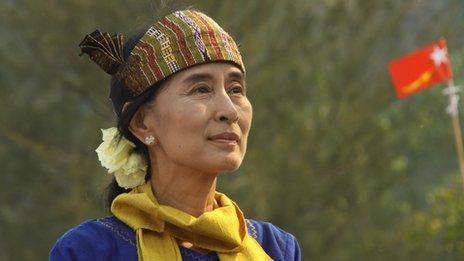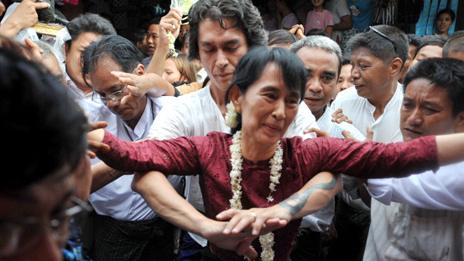Aung San Suu Kyi: 'I have personal regrets'
- Published

Aung San Suu Kyi, the Burmese dissident and Nobel Peace Prize winner, spent most of the past two decades under house arrest in Rangoon, thousands of miles from her husband and children in the UK. She has rarely talked about the pain of this separation.
"I think she's genuinely strong. And you know even if she's sad at something, she knows she's got to get on with things. She's not going to waste time crying about it," says Kim Aris, Aung San Suu Kyi's son.
Every day for almost 20 years, Aung San Suu Kyi faced a choice - to remain imprisoned in her house in Rangoon or re-join her family in Oxford, knowing that if she chose to leave she might never be allowed to return and lead her people.
"Of course I regret not having been able to spend time with my family," says Suu Kyi.
"One wants to be together with one's family. That's what families are about. Of course, I have regrets about that. Personal regrets.
"I would like to have been together with my family. I would like to have seen my sons growing up. But I don't have doubts about the fact that I had to choose to stay with my people here," she says.
Suu Kyi is the daughter of Burma's independence hero, General Aung San, assassinated when she was only two.
She always believed it was her destiny to serve the people of Burma, even telling her English husband-to-be Michael this on the eve of their marriage.
"I wanted to make sure that he knew from the very beginning that my country meant a great deal to me and should the necessity arise for me to go back to live in Burma, he must never try to stand between my country and me," she says.
After a period working overseas, she and Michael settled into Oxford academic life, raising their two young sons, Alexander and Kim, until Suu Kyi's mother became critically ill in Rangoon in 1988.
When she returned to Burma to care for her mother, Suu Kyi became a figurehead for democracy protests, founding the NLD party.
The military junta which seized power confined Suu Kyi to her house - and family life came to an end.
"The parting of the way came when I was placed under house arrest," she says.
"Then of course I knew that my relationship with the family was going to change considerably because we would not be able to be in touch with each other," says Suu Kyi.
The military junta thought it could pressure Suu Kyi to leave Burma by exploiting this fact.
"The first Christmas after I was placed under house arrest, Michael was allowed to come to see me but they wouldn't let the children come," she says.
But Suu Kyi stayed in Burma, committed to the struggle for political reform - although the personal sadness remained.
"There are things that you do together that you don't do with other people. It's very special. A family is very special. So when a family splits up, it's not good, it's never good," she says.
It was 12 years before she would see her younger son, Kim, again.

Kim Aris helps protect his mother from a crush of admirers in Bagan, July 2011
When he was finally allowed to visit his mother in Burma, they would bond over a love of music.
"He brought his music with him. He had all these tapes and he would say, 'Now do you know who that is, mummy?'
"And I'd get it all wrong, but later I began to learn who was who. He plays a lot of Bob Marley, so I learnt to like Bob Marley," she says.
The pressure on Suu Kyi increased when her husband - still living in the UK - was diagnosed with terminal cancer in 1997.
The military regime said that she could leave to be with him - but she believed she would not be allowed back. Neither Suu Kyi nor her husband were prepared to contemplate this.
"There never was a point when I thought of going. I knew that I wouldn't go. And he knew too," she says.
Michael died in 1999.
Ten years later, with Burma struggling economically, its rulers began to see that they needed help from the West to compete - but that meant introducing reform and ultimately, in 2010, ending Suu Kyi's house arrest.
Today, Suu Kyi and many NLD members have been elected to the parliament led by the generals, though full democracy remains a distant prize.
Although the legacy of personal sacrifice remains, Suu Kyi remains optimistic for the future.
"We know that something remarkable is going on. We are all aware that this is a very unusual time for Burma. This is an extraordinary moment for our country."